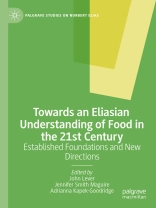This edited volume serves as an overview and introduction to the conceptual apparatus of Norbert Elias for newcomers, while also outlining current research within the Eliasian school of sociology. An Eliasian or figurational approach foregrounds process, is sensitive to long-term historical development and changing power relations and is methodologically diverse. Elias’s work is now found across academic disciplines and this volume contains contributions by sociologists, anthropologists, business and management scholars, and those working at the interface of sociology and human geography. Instead of simply highlighting the distinctiveness of the school vis-à-vis other theoretical traditions, this volume outlines how Eliasian inspired work can contribute to important debates on the future of food across academic disciplines.
สารบัญ
Chapter 1: Introduction: Towards an Eliasian understanding of food in the twenty first century.- Chapter 2.- All Manners of Food in retrospect.- Chapter 3: Eating in the Netherlands.- Chapter 4: All Manners of Food in Japan: An Overview of the Civilising of Appetite from the Ancient Period to the Modern Period.- Chapter 5: An Eliasian analysis of Vedat Milor’s gastronomic writing and interplay of identities.- Chapter 6: Is cooking art ? The artifying process and its limitations.- Chapter 7: Informalisation and food choice: understanding halal food production and consumption in ‘the West’.- Chapter 8: The social power of food for identity and health: A case study of Chinese communities in the UK.- Chapter 9: Vina aperta and the quest for interconnectedness: Wine and an Eliasian sociology of food.- Chapter 10: Food in/securities and mutual interdependencies in a Kenyan ‘slum’: a study of the social impacts of an urban farming programme.- Chapter 11: ‘Lost then Found’ drinking coffee in towns: can Eliasian inspired introspection inform re-figurations of space?- Chapter 12: Something fishy in the civilising process.- Chapter 13: Contemporary social processes; towards ecological food utopias.-Chapter 14: Food systems in transition: sociological insights for turning complexity into clarity.
เกี่ยวกับผู้แต่ง
John Lever is Reader in Sustainable and Resilient Communities at Manchester Metropolitan University.
Jennifer Smith Maguire is Professor of Cultural Production and Consumption at Sheffield Business School, Sheffield Hallam University, UK.
Adrianna Kapek-Goodridge is Doctoral Candidate in the Department of Management, University of Huddersfield, UK.












